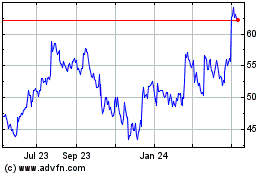CDC Links Bacterial Infection in Patients to LivaNova Surgical Device
October 13 2016 - 1:50PM
Dow Jones News
Researchers linked a rare but potentially lethal bacterial
infection that has affected patients in at least three states to
contamination of a device used in open-heart surgery centers. At
least four patients in the U.S. have died.
In a report published Thursday by the U.S. Centers for Disease
Control and Prevention, the researchers said a genomic analysis
"strongly" suggests that the infections arose from a common source:
a heater-cooler device that helps control a patient's body
temperature during open-heart operations.
The device, called the Stö ckert 3T, is manufactured by LivaNova
PLC of the U.K. and accounts for an estimated 60% share of the U.S.
market for the machines, according to an account of the research
published in the CDC's Morbidity and Mortality Weekly report.
The report is the latest development in an 18-month effort to
solve a mystery over the origin of the unusual infection, which
first surfaced in a cluster of patients in Switzerland in the
spring of 2015. Some patients in Germany have also been
infected.
Since the Swiss outbreak, the CDC has learned of 28 cases in the
U.S., including 21 in Pennsylvania, five in Iowa and two in
Michigan, a spokeswoman said. The four associated deaths were in
Pennsylvania.
Late last year, the U.S. Food and Drug Administration blocked
imports into the U.S. of the LivaNova device, manufactured in
Germany, after issuing a warning letter related to manufacturing
violations at the company. The FDA didn't ask hospitals to stop
using existing units, though the agency and the CDC have issued
recommendations for reducing risk of the infections.
LivaNova was recently formed by the merger of Sorin S.p.A. and
Cyberonics Inc. The company said it aware of the new report and is
"working with regulators to develop a solution that addresses their
concerns and assures continued clinician access to this important
device, which enables lifesaving cardiac surgery."
The devices circulate water to warm or cool patients undergoing
coronary artery bypass surgery or such other procedures to replace
heart valves or diseased aortic tissue. The water doesn't come in
contact with patients, but the FDA has said it is possible for a
bacterium that gets established in the device to become aerosolized
in the operating room through the device's exhaust vent.
The culprit is an organism called Mycobacterium chimaera, one
species of what are called nontuberculous mycobacteria that are
common in nature and found in water, soil and tap water. Generally
they aren't harmful to people, but the FDA says they can cause
serious infections in patients who are severely ill or who have
weakened immune systems.
For the new report, researchers sequenced samples of M. chimaera
taken from 11 patients infected in Iowa and Pennsylvania and from
five of the devices used in hospitals in those states.
All had the "identical fingerprint," said Dr. Michael Bell,
deputy director of the CDC's division of health-care quality
promotion. "We definitely have a multistate outbreak related to
this one machine." The results almost certainly mean "the machines
were shipped with the contamination," he said.
How many patients may have been infected by the contaminated
device is difficult to determine. The infection is especially
slow-growing, said Charles Daley, chief of the division of
mycobacterial and respiratory infections at National Jewish Health,
Denver, and often doesn't cause symptoms for months or even years.
Neither patients nor doctors even connect symptoms to the
operation.
He said open-heart-surgery patients who experience such symptoms
as chills, fatigue, fever, and unintended weight loss even long
after their operation should be tested for the infection. Most of
the confirmed patients had a valve or other prosthetic tissue
implanted during their surgery, said Dr. Daley, who is a co-author
of the report.
"Once valves get seeded with these organisms, it becomes very
difficult to treat," he said.
The evidence so far suggests that somewhere between one in 100
and one in 1,000 patients whose surgeries involved the device might
develop an infection. Caught early, it is generally easy to treat,
he said. "It may be low-risk, but once it happens, it's very bad
for the patient."
Previous reports have shown that cases in Europe are linked to
samples of M. chimaera found at the company's manufacturing
facility in Germany. Efforts are under way to determine whether
infections in the U.S. patients arose from the same source.
Write to Ron Winslow at ron.winslow@wsj.com
(END) Dow Jones Newswires
October 13, 2016 13:35 ET (17:35 GMT)
Copyright (c) 2016 Dow Jones & Company, Inc.
LivaNova (NASDAQ:LIVN)
Historical Stock Chart
From Mar 2024 to Apr 2024

LivaNova (NASDAQ:LIVN)
Historical Stock Chart
From Apr 2023 to Apr 2024
